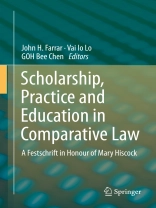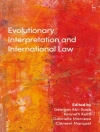This book examines how law functions in a multitude of facets and dimensions. The contributions shed light on the study of comparative law in legal scholarship, the relevance of comparative law in legal practice, and the importance of comparative law in legal education. The book will particularly appeal to those engaged in the teaching and scholarship of comparative law, and those seeking to uncover the various significant dimensions of the workings of law.
The book is organised in three parts. Part I addresses scholarship, with contributors examining comparative legal issues as critique and from a theoretical framework. Part II outlines practice, with contributors discussing the function of comparative law in such comparatively diverse areas as international arbitration, environment, and the rule of law. Part III appraises comparative law in education.
Daftar Isi
Chapter 1. Introduction: Comparative Dimensions Of Law In Context (John Farrar and GOH Bee Chen).- Part I: Scholarship.- Chapter 2. Recent Developments In Australian PPSA Case Law And Their Relevance To Other PPSA Jurisdictions (Anthony Duggan).- Chapter 3. A Return To That Other Country: Legal History As Comparative Law (Derek Roebuck).- Chapter 4. The Value Of Comparative Approach In Treaty Interpretation (Chang-fa Lo).- Chapter 5. An Idea For A Better World: Human Rightsponsibility (GOH Bee Chen).- Chapter 6. Financial Stability After The Global Financial Crisis: Globalisation, Nationalism And The Potential Demise Of A Rules-Based Order (John Farrar and Louise Parsons).- Part II: Practice.- Chapter 7. The Comparative Dimension Regarding Approaches To Decision-making In International Tax Arbitration (Michelle Markham).- Chapter 8. Conflict Of Laws In International Arbitration? Choice Of Law For Arbitration Agreement In The Absence Of Parties’ Choice (Winnie Jo-Mei Ma).- Chapter 9.From Transplantation To Anticipation: Challenges For Environmental Law In A No-Analogue Future (Jan Mc Donald).- Chapter 10. Rule of Law As Comparative Law: Indonesia Revisits Code Reform (Veronica Taylor).- Part III: Education.- Chapter 11. Comparative Law In Chinese Legal Education (Vai Io Lo).- Chapter 12. Conclusion: The Relevance Of Comparative Law (Vai Io Lo).
Tentang Penulis
John Farrar is Emeritus Professor of Law at Bond University, Gold Coast, Australia and Honorary Professor of Law at the University of Auckland, Auckland, New Zealand. He is a specialist in comparative corporate law and corporate governance, and the impact of the global financial crisis on regulatory systems. He teaches and supervises research in corporations law, corporate governance, white collar crime and fraud, and corporate insolvency.
Vai Io Lo is Professor of Law at Bond University, Gold Coast, Australia. Her research concentrates on comparative and interdisciplinary studies, especially on Australian, Chinese, Japanese and US laws, and in the areas of labour and employment, foreign direct investment, healthcare, dispute resolution, law and society, legal education, judicial reform, international trade, and consumer protection.
GOH Bee Chen is Professor of Law at Southern Cross University, Gold Coast, Australia. A former Malaysian Rhodes Scholar, her research interests include dispute resolution (with a focus on Sino-Western issues), international law of peace, law and religion, organics law and climate justice.












